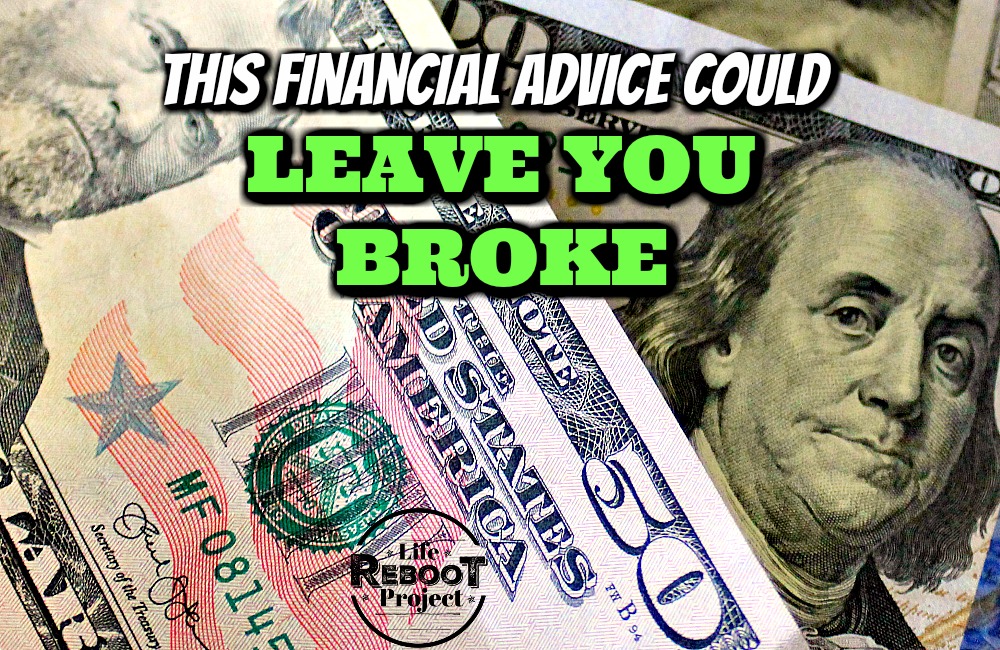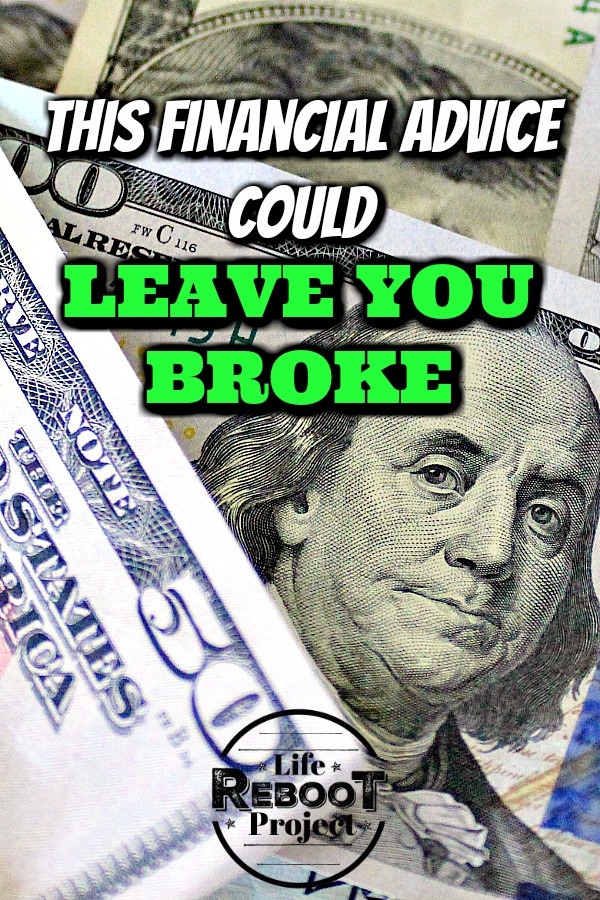
I’ve heard some terrible financial advice getting dispensed as common knowledge, but some of it is just plain wrong or could leave you broke or financially dependent in a job you hate just to keep the money flowing.
eave you broke or financially dependent in a job you hate just to keep the money flowing. This advice will lead you cunningly away from the primary goal of becoming financially independent and out of the daily grind of a job. I got caught up in almost all of these traps at one time or another. Now as I look back, it’s probably cost me thousands of dollars.
I see the point of some of the advice given. Some of these things probably worked out for some people, but they didn’t take the full perspective as to why they worked out before they started dispensing advice.
This advice I don’t think is wrong in every situation, but it doesn’t work in every case. So here I am being the voice of opposition and telling you not to do these things.
The fact is I just want to give you a broader picture of this advice so you can better make your own decisions. If you can find just the right situation, what I consider as lousy advice might just work out for you.
Crappy Financial Advice #1; Your home is like an investment.
A home can be like an investment if you go into buying a house like you would an investment. Not every home purchase will make you money. As I’m writing this, we are in a seller’s market in my area. There are bidding wars going on for property and homes which are selling for more than the assessed value.
If you couple that with the finance charges you will pay, even at reasonable interest rates, you will likely be paying more for your home than you will get when you sell it. Now couple this with the fact that you will need to pay for upkeep and maintenance.
Upkeep and maintenance will also cost you time. This is some time when you could either be enjoying life or working on a side business which could become more profitable than the investment of owning the home. Homeowners should set aside a portion of their budget for home repairs, especially for unexpected issues like a frozen ac unit inside the house. Also, you need to contact an expert plumber whenever there’s an issue, like tankless water heater repair or anything about the plumbing system. Also, consider contacting Seattle Plumbing Repair Services for immediate assistance. If you’re planning on having home repiping, contact an expert to help you. Upgrades like a garbage disposal replacement, appliance repair and tune-ups, etc should as well be considered. Those who need garbage disposal services may consider getting help from a team of highly skilled professionals.
If you can find a home at a time when the economy is distressed and in a buyer’s market, you pay way less than the assessed value, and you finance very little if anything at all, you could wind up having a pretty good investment on your hands.
So, the general advice that owning a home is like an investment isn’t entirely accurate. It’s only true if you can find the right deal.
Crappy Financial Advice #2; Buy a new car, it’s worth having the warranty.
I cringe every time I see people suckered into the trap of buying a new car. I’m again not saying all new car deals are destructive to our finances, but most of them will rob you blind.
New cars are incredibly reliable today. The amount you pay in finance charges, extra high insurance costs, and depreciation, most new car deals are losers. You’d be better off buying something slightly used and putting the extra money you would have spent on buying new into a bank account every month. Use that bank account to pay for repairs which would have been covered by the warranty.
I would bet, that by the time you sell that car to buy a different one, that bank account will be big enough to pay for a new car in cash. The problem is, that most people who buy a used car and don’t save any of their money will feel a pinch every time their car breaks down.
The idea here is to tuck away some money each month into a savings account just to handle your car costs. The upside to buying a new car is that it is like a treat. Let’s say you drove trashy cars your whole life. But, you socked a little money away every month for your dream car.
One day you could walk into that dealership and negotiate a great deal on the car of your dreams and pay for it in cash. You will take a financial hit on the depreciation of that car, but if your dream is to own that car and you worked hard to save up the money. I can see that being a good thing. I would probably have to be financially free and be making at least four times the cost of that car every year for me to buy something new.
Crappy Financial Advice #3; Max out your 401K contribution.
I hear this all the time. Let me be very clear. Not all 401K opportunities offered by employers are good deals. I’ve lost money in 401K programs through employers, so why would I want to give them the full amount of money possible? In my experience with a couple of 401K opportunities over the years, I found it best to test the waters first.
I start with the very smallest amount, then monitor it for a full year. Most of these programs will let you change your contributions and investments at least once a year. I always went with a category with index funds because I never trusted people managing my money.
The other thing to watch out for in 401K’s are fees. In very small growth years, the fees can rob you blind and leave you losing money for the year. If you find a fund where you are making some money, and the fees aren’t killing you, then it might be right to ‘up’ your contribution.
I would not dole out the advice to always max your contribution. If you are a savvy investor and it has become somewhat of a hobby to you, I would forgo the 401k route and start investing on your own. The more you work it, the better it will be for you than a typical 401K. Just make sure to do your research.
Crappy Financial Advice #4; Carrying a balance on your credit card will improve your credit rating.
I cringe again every time I hear this advice given out. I use credit cards every month and for most of my purchases. I haven’t carried a balance on my cards since I had my credit crisis in the early nineties. My credit rating is excellent.
I’m not telling you this to brag. I’m talking about this to illustrate the point that you don’t need to carry a balance on your card just to get a higher credit rating. Use your cards every month yes, but make sure you pay off your card every month in full. Want to improve your credit rating?
Pay all your bills each month and in full all the time. Your credit rating will climb. If you rent an apartment with other people, but keep handing over cash each month to other people to pay the utilities, put the utilities in your name, so you get credit for paying them every month.
The downside to this is you will need to make sure you collect all the money every month from your roommates. It can be kind of a headache sometimes, but it will build your credit over time.
Crappy Financial Advice #5 | Cut up your credit cards and only pay in cash.
When I was getting out of debt, I only paid in cash for quite a while. I was a sole believer in this until I started hearing some stories circulating the web that contradicted what I thought. The stories I heard were from people who did experiments with this. They stopped using their credit cards and started only paying cash. Their credit rating dropped 100 points in just a couple of months.
They started using credit cards again and paid off the balance every month, and their credit rating started to rebound. With the benefits our credit card system is offering now, I wouldn’t ever feel the need to just pay in cash. The only point I need to be very clear on my advice is to make sure you pay them in full every month.
Carrying a balance will only lose you money every month. The way things are now, everyone needs to educate themselves about money and think through the advice they get about their money. I’m not saying everyone is out to deceive you, but much of the advice given will work maybe in certain situations but doesn’t work in every case.
Before you make decisions about your money, think through all the possible scenarios where that advice will not work. Then either find the situation where it will work for you or go in a different direction. I believe that you will need to get on the path to financial independence. Part of financial independence is taking total control of your financial decisions and not letting others do it for you.
Till next time, be safe,
Kevin

